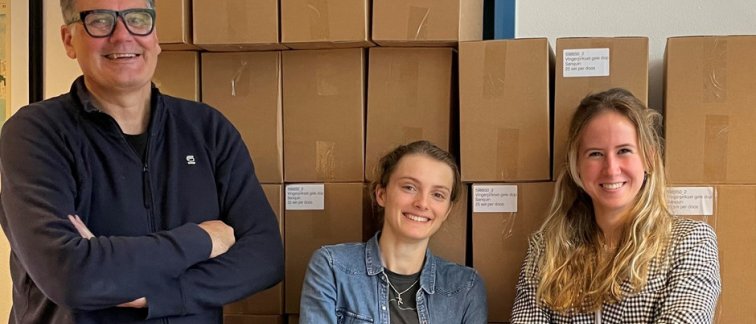In the early 2020s, rheumatologist and researcher Dr. Gertjan Wolbink, affiliated with Sanquin, Amsterdam UMC and Reade, realized that corona would also affect the Netherlands. ‘As a rheumatologist, I immediately thought about my own patient group. In the event of a pandemic, they would possibly have less defense and no immunity, while we are dealing with a highly contagious virus.' When the coronapandemic broke out in our country, he was able to use his knowledge and experience to set up a new large-scale study in a short period of time together with principal investigator Dr. Theo Rispens of Sanquin, microbiologist Erik Vogelzang and PhD students Femke Hooijberg and Laura Boekel. The study is called 'Impact of the COVID-19 pandemic on patients with an inflammatory rheumatic disease'. Gertjan and Laura share more information about the research and the results known so far during an interview with ZonMw.
Disease severity and antibody response in different groups
In rheumatic diseases, the body's immune system is dysregulated, causing chronic inflammation. In order to suppress or reduce the symptoms, people with a rheumatic disease are given medication that suppresses the body's defenses.
Gertjan: 'Together with microbiologist Erik Vogelzang, we saw an opportunity in the emergence of COVID, which at the time was still literally far from our bed. In early February 2020, even before the first infected COVID-19 patient was known in the Netherlands, we already had a research design. We wanted to compare disease severity and antibody production after COVID-19 infection in healthy people with our own patient group - people with rheumatic disease - and repeat this at a later stage after vaccination.
To do this, we needed to develop an assay that would allow us to measure antibodies in the blood. So we immediately started following healthy people infected with COVID-19. In the early 2020s, these were initially people who had returned sick from winter sports. Thanks to blood samples from this group of people, principal investigator Theo Rispens of Sanquin was able to develop an assay that is very sensitive and specific for detecting antibodies against the coronavirus. This way we could reliably determine whether someone had experienced a corona infection. In the end, we followed 4,000 people, including a large part of the Amsterdam rheumatoid arthritis population.'
Innovation of research methodology by corona
Conducting this extensive study came at the right time for Laura Boekel. She had at that time just completed her bachelor's degree in medicine and will receive her doctorate as an epidemiologist in 2022. As a research talent, Laura was asked to coordinate this research. Laura was also nominated for the Nicolaes Tulp Prize for best research and won this prize. Because not only the speed of this research was groundbreaking, also the method that was used.
In a short period of time we had an online platform through which we could send out questionnaires, in addition to sending material for participants to take blood samples. Through this online platform we were in touch with our participants. In this way it became possible to collect data very quickly. Almost real-time! We published the first results in August 2020,' Laura says enthusiastically.
What insights did these questionnaires provide?
'The quantitative data showed that rheumatoid arthritis patients were less likely to be infected with COVID-19. Through the questionnaires we had sent out and received from the patients, we could quickly conclude that this difference could be explained by the fact that people with rheumatism isolated themselves more strictly than healthy controls and were therefore less exposed to the coronavirus. Thus, no medically identifiable reason had been found. In the context of vaccination, we were able to find out very quickly via the online platform how high the vaccination readiness was among rheumatoid arthritis patients. This percentage turned out to be just as high as the control group with people in good health,' says Laura. 'And what's further unique about the platform is that we can link results directly back to the participants themselves, both individual blood test results and general updates on our findings.'
Rituximab use reduces effect of vaccination in rheumatoid arthritis patients
'From April 2021, we followed vaccinated patients. This part of the study showed that rheumatoid arthritis patients taking the drug Rituximab were less protected against a COVID-19 infection after vaccination because this drug kills B cells. And B cells make antibodies that can attach to the pathogen. With viruses, the antibodies that B cells make prevent the virus from entering cells and clearing out of the body more quickly. Because of the use of this medicine by rheumatoid arthritis patients, this patient category therefore runs a greater risk of becoming seriously ill in the event of infection with the coronavirus. In consultation with the RIVM, a third vaccination in the national vaccination program was therefore introduced early for this patient group in the hope of strengthening the immune response’ says Laura.

Further optimization
The combination of a digital platform and the use of finger pricks means that the research of Gertjan and Laura is very flexible and can anticipate changes in the pandemic. The prospective design and simultaneous tracking of a large group of healthy control participants means that the data is of high quality. Gertjan: ‘As a result, we have repeatedly been able to collect and publish important data quickly and our results have been used, for example, in policy-making regarding corona vaccinations for vulnerable groups. In addition, the interaction we have with the participants is unique: we share all our findings that we publish and results of blood samples are individually fed back to people.
All of these aspects we hope to further optimize in the coming period, so that we can transform our research platform into something that we can continue to use in the future, for both COVID-specific and other scientific research. In order to achieve this, we will need to seek additional funding. However, we hope to have now proven that our research is worth investing in, and that we can get further support to develop and deliver on our future plans!’
Curious to learn more about this research project? Find the project page (in Dutch) here.
Source: read the original (Dutch) article by ZonMw here.

